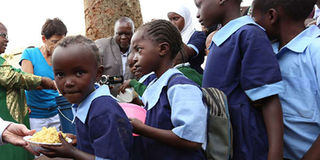Coronavirus worsens malnutrition burden

Mathare Primary School pupils are served lunch on January 23, 2014. PHOTO | FILE | NATION MEDIA GROUP
What you need to know:
- Due to restrictions, many families in the low-income sector cannot access a balanced diet, further threatening the lives of children.
- World Food Programme says the 368.5 million children across 143 countries who rely on school meals must look for other sources.
As the fight against Covid-19 intensifies, more Kenyans are joining the starving lot, with the most affected being children.
The World Health Organisation (WHO) said the situation will likely further the burden of malnutrition in Africa.
“The impact of the disease is expected to be greater among those grappling with food scarcity and malnutrition, while widespread food insecurity will likely increase due to movement restrictions,” WHO Regional Director for Africa Matshidiso Moeti said, adding that susceptibility to diseases will be heightened.
Already Kenya is not doing well in terms of food security. In a recent Global Hunger Index report, the country scored 25.2, which means the situation is serious, and remained at position 86 out of 117 countries listed in the report.
Nationally, 26.2 per cent of children under five years are stunted and four per cent suffer from wasting, a situation set to be worsened by the pandemic.
Due to restrictions, many families in the low-income sector cannot access a balanced diet, further threatening the lives of children.
According to the Famine Early Warning Systems Network (FEWS NET), the food insecure population in Kenya will likely be highest in May and June “due to a decline in food access among poor urban households”.
FOOD INSECURITY
Currently, most arid counties are “food stressed” and by June the situation will start to deteriorate, according to FEWS NET.
“It is a difficult situation for both children and parents. We are in a very peculiar circumstance due to the pandemic and the measures which governments have taken,” said Ms Rosemary Ngaruro, a nutritionist.
Many children were depending on food rations in schools but they have been forced to stay home after all learning institutions were closed.
According to the World Food Programme 368.5 million children across 143 countries who rely on school meals must look for other sources.
Ms Ngaruro said the government and development partners should include milk in packages being delivered to families affected by floods and lockdowns.
Lack of breakfast leads to increased irritability among children because of lack of enough blood sugar
Ms Ngaruro advised parents to take advantage of the vegetables and fruits available because of the ongoing rain to feed their children saying they are immune boosters.
LIFESTYLE
Global Hunger Index report indicates the highest stunting rates in Kenya are in Kitui (45.8 per cent) and West Pokot (45.9 per cent).
Wasting is highest in Turkana County ( 22.9 per cent), Marsabit (16.3 per cent), Mandera (14.8) per cent, West Pokot (14.3 per cent) and Wajir (14.2 per cent).
On the other hand, WHO says children from affluent neighbourhoods may be consuming unhealthy diets.
"High consumption of processed and canned foods combined with reduced physical exercise could worsen obesity and diabetes, risk factors documented as increasing severity of Covid-19."
It emphasises on the importance of whole grains, cereals, lentils, peas and beans.





